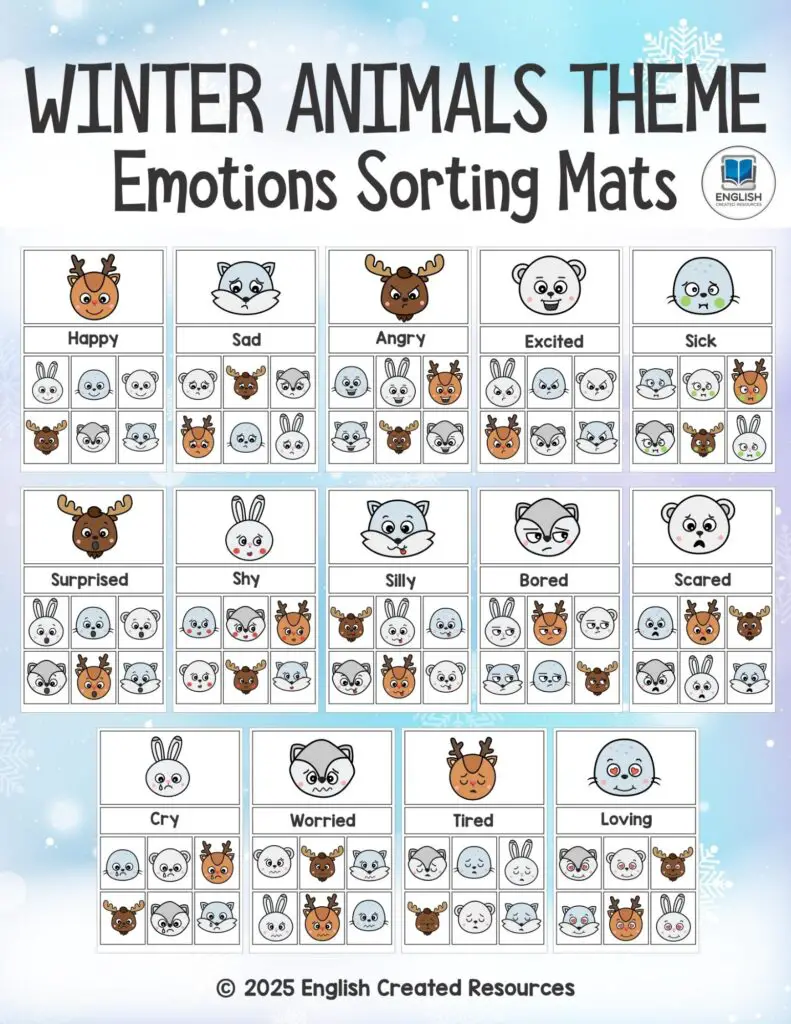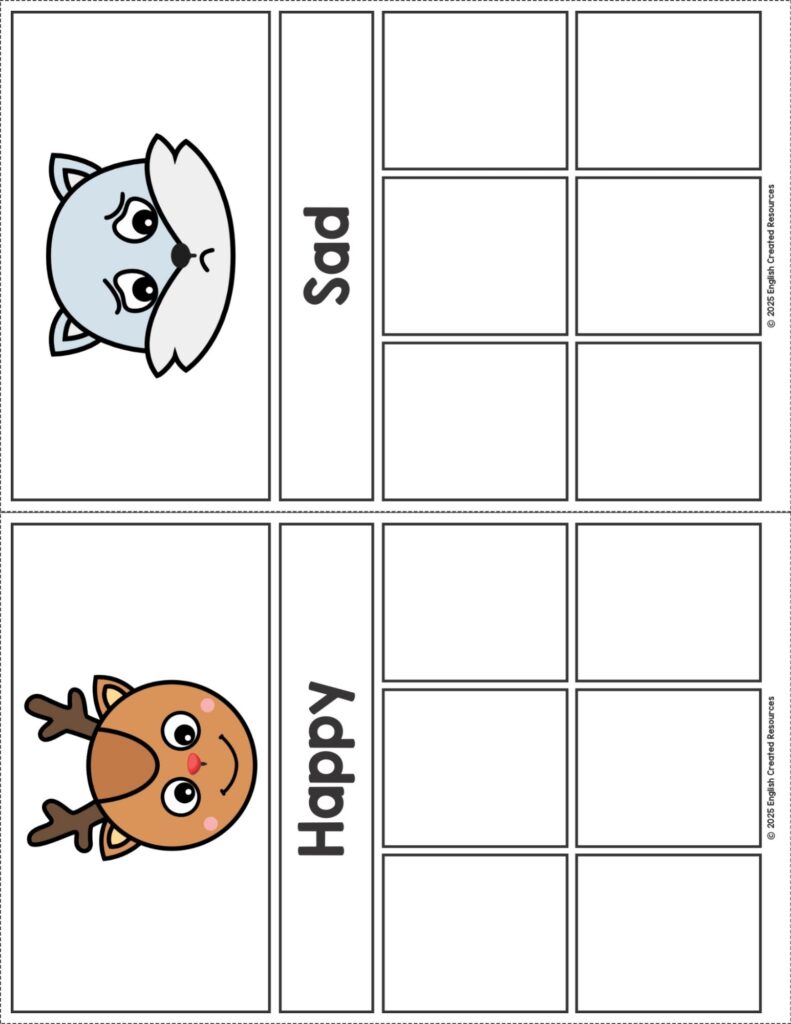Winter Animals Emotion Sorting Mats

Winter Animals Emotion Sorting Mats
Sorting mats are educational tools commonly used in early childhood education settings, particularly in preschools. These mats come in various shapes, colors, and sizes and typically feature spaces or compartments where children can place different objects based on common attributes such as color, size, shape, or category. Sorting mats provide a structured environment for children to engage in sorting activities, which may seem simple but are incredibly beneficial to their cognitive, social, emotional, and physical development. In this essay, we will explore the significance of sorting mats for preschool children and how they contribute to their overall learning and growth.
- Enhancing Cognitive Development
One of the primary ways sorting mats support preschool children is by enhancing their cognitive abilities. Sorting is a fundamental cognitive skill that promotes critical thinking, problem-solving, and memory. It encourages children to observe objects closely, analyze their properties, and categorize them accordingly. As children sort items into different groups, they are learning to identify and understand concepts such as similarities, differences, and patterns.
Sorting activities help children develop their classification skills, which are crucial for early math learning. Sorting by size, shape, color, or even texture, teaches preschoolers about basic mathematical concepts such as more, less, bigger, smaller, and equal. These foundational concepts are key building blocks for later mathematical learning, including addition, subtraction, measurement, and even geometry.
Additionally, sorting encourages children to make connections between objects and categorize them according to certain characteristics. This strengthens their logical thinking and ability to categorize objects in the real world. For example, a child may sort a set of fruit by color (red apples, yellow bananas), which indirectly enhances their ability to organize information and establish order.
- Developing Fine Motor Skills
Sorting mats also play a significant role in the development of fine motor skills. Fine motor skills refer to the small movements of the hands and fingers, which are essential for tasks like writing, using utensils, and dressing. Sorting mats encourage children to manipulate objects, which strengthens the small muscles in their hands and fingers.
For example, when children use tweezers or small containers to pick up and sort objects, they practice their pincer grasp, which is vital for later tasks such as holding a pencil. By repeatedly engaging in sorting activities, children can improve their hand-eye coordination, precision, and dexterity. These fine motor skills are essential for daily activities and academic tasks that preschoolers will encounter as they grow.
- Fostering Language Development
Sorting mats also play a crucial role in enhancing language development. As children engage in sorting activities, they are often required to talk about what they are doing. This verbalization helps to expand their vocabulary and improve their communication skills. Teachers and caregivers can encourage children to describe their sorting process, ask questions, and share their reasoning behind their decisions.
For instance, a teacher might ask, “Why did you put the red blocks in this section?” This prompts children to think and explain their actions, which improves their ability to express themselves. Additionally, children learn new words related to colors, shapes, sizes, and categories, all of which are essential in early language development.
Sorting mats also provide a great opportunity for building social skills. As children work together, they may have to negotiate, share space, or explain their sorting choices to others. This collaborative aspect fosters the development of social language, such as taking turns, listening, and asking for help. All of these interactions contribute to the child’s growing communication abilities.
- Supporting Emotional Growth
While sorting mats are primarily cognitive and physical tools, they can also support emotional development in preschool children. When children engage in sorting activities, they experience a sense of accomplishment as they complete tasks. This can boost their confidence and self-esteem. Successfully completing a sorting activity helps children feel competent and capable, which is an important aspect of emotional growth.
Moreover, sorting activities can help children manage their emotions. Preschoolers often struggle with concepts of frustration or impatience, but sorting tasks can provide a sense of control and autonomy. By working independently or in small groups, children can learn to navigate their emotions, deal with challenges, and experience the satisfaction of completing a task.
Additionally, sorting activities can encourage patience and perseverance, as children may need to sort a variety of objects or revisit their choices to complete a task. In doing so, they learn the value of persistence and working through challenges—skills that will benefit them in school and in life.
- Improving Focus and Attention
Sorting mats also help preschool children develop their attention span and ability to focus. Sorting tasks are typically designed to be engaging but not overly complex, which makes them a great tool for developing concentration. As children sort objects, they need to focus on the task at hand, paying attention to the specific attributes of the objects they are sorting.
This helps children practice staying engaged in a task for an extended period, which is a crucial skill for later learning. Additionally, sorting activities require children to follow directions, organize their thoughts, and execute tasks in a systematic manner. These skills are transferable to other areas of learning, such as reading, writing, and problem-solving.
By regularly practicing sorting with mats, children learn how to sustain their focus and complete activities with attention to detail. This focus is essential not only for academic success but also for everyday tasks such as listening to instructions, following routines, and completing chores.
- Promoting Social Interaction and Collaboration
Sorting mats are excellent tools for promoting social interaction and collaborative play. When children work together on sorting activities, they learn essential social skills such as teamwork, communication, and conflict resolution. For example, they might discuss how to categorize objects, share space, or help each other with difficult tasks. These interactions provide opportunities for children to practice negotiation and compromise.
Furthermore, sorting mats can encourage peer-to-peer learning. Younger children may learn from their older peers as they observe different sorting strategies. Older children, in turn, may develop a sense of responsibility and leadership as they help their younger classmates. This creates an inclusive learning environment where social skills and cooperation are valued and practiced.
- Cultivating a Love for Learning
Finally, sorting mats help cultivate a love for learning by making educational activities fun and interactive. The hands-on nature of sorting activities, combined with colorful and engaging visuals, holds children’s attention and makes learning feel like play. This helps children develop a positive attitude toward learning and can spark curiosity and exploration.
When children enjoy the process of sorting, they are more likely to approach other educational tasks with enthusiasm and interest. This love for learning in the early years lays the foundation for future academic success and a lifelong passion for education.
In conclusion, sorting mats are a powerful tool for fostering the development of preschool children. Through sorting activities, children enhance their cognitive, fine motor, language, and social skills, all while building their attention span, emotional resilience, and focus. Sorting mats provide an opportunity for hands-on learning, critical thinking, and collaborative play, making them an essential resource in early childhood education. By engaging with sorting mats, preschool children not only develop essential academic and life skills but also begin to cultivate a lifelong love for learning.
Samples From the File





